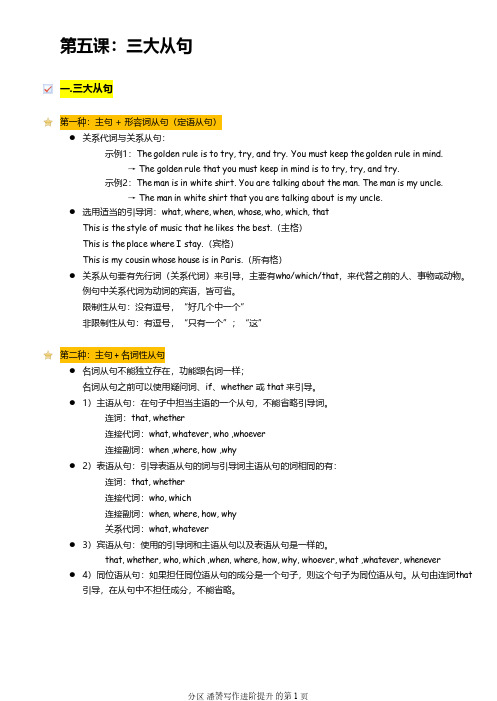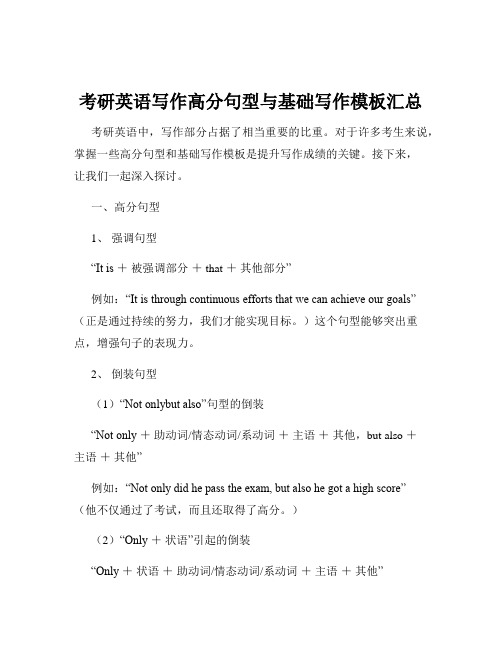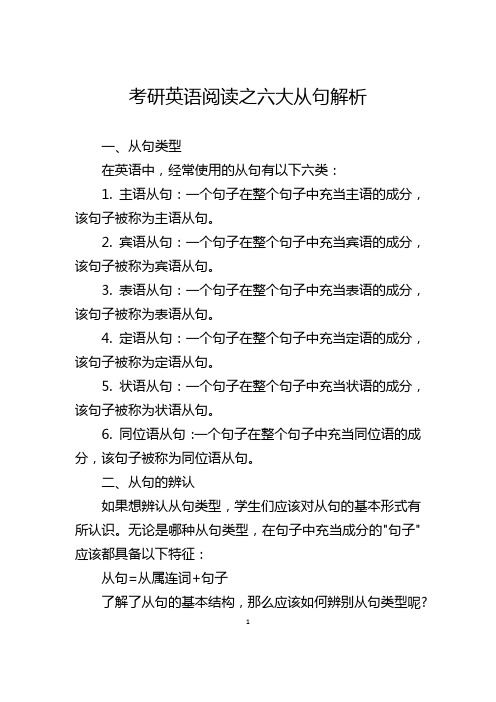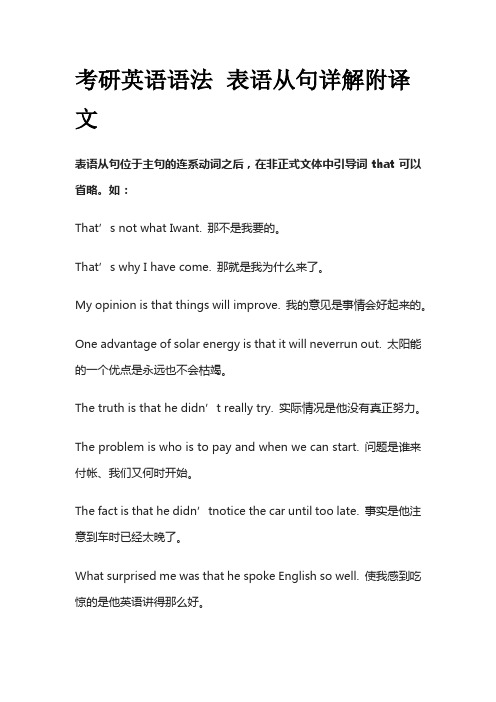考研基础写作——写从句
考研英语从句语法

考研英语从句语法1.同位语从句:同位语从句在句中作A同位语,对被修饰名词的内容予以解释说明。
同位语的特点是:抽象名词在前,表达具体内容的从句在后。
常见的名词包括: assumption假定/belief看法/ conclusion结论/ doubt疑心等。
例句:The suggestion that we should develop the natural resources in the region has been discussed. 关于我们应该开发本地区资源的建议已经讨论过了。
2.现在完成时:表示过去延续到现在的动作或状态。
具体来说,这种用法是表示开始于过去的动作一直持续到现在,而且还可能继续持续下去。
谓语动词一般为延续性动词。
例句:An old woman walked out into the middle of the street. The policeman yelled to her, “Don’t you know what it means when I hold up my hand?〞 The lady said, “Sure I do. I have been a schoolteacher for 28 years now.〞一个老妇人走到了马路中央,这时,一位交警朝着她嚷道:“我都把手举起来了,你难道还不知道什么意思吗?〞老太太说:“我当然知道,我都做了28 年的老师了。
〞3.时间状从:not…until…用法。
例句:The students didn’t stop talking until the teacher came in.4.it做形式主语,句子做逻辑主语:如果主语太长,常用代词 it 作形式主语,将真正的主语从句置于句尾,以保持句式的平衡。
例句:It makes no difference what you read or study if you can’t remember it. 如果你记不住,那么你读什么或者学什么都不重要了。
2019考研英语作文:名词性从句+形容词性从句

2019考研英语作文:名词性从句+形容词性从句大家都知道作文中一些亮眼的句子会给作文加分不少,那么哪些句子用了可以加分,又怎么去用呢?接下来为你一一解答。
一、名词性从句名词性从句包括主语从句、宾语从句、表语从句和同位语从句,怎么将这些从句用到作文中,使作文语句变得高级?首先,先搞清楚名词性从句的常见引导词其次,考研写作中怎么用这些从句?考研写作中常用宾语从句来提出观点考研写作中,表语从句的两个句型为:‘’The reason why ...is that...“(注意这里的that不能换成because)。
“lt (This/That)is because...”。
考研写作中常用的名词引导词有:belief, fact, hope, doubt, idea, news, conclusion, problem。
给大家举几个例子:1. However , we must realize that traditional Chinese culture is the root to live by . 然而,我们必须认识到,中国传统文化是我们赖以生存和发展的根本。
(that 引导的宾语从句)2. In the early days , we enjoyed what our parents bestowed.年少时,我们享受着父母给予我们的一切。
(what 引导的宾语从句)3. The root cause , however , is that those adult children’sMentally fails to mature , only taking thing from their parents and giving nothing in return . 但根本原因应该是年轻人心里不够成熟,只知道索取,不知道回报。
(that 引导的表语从句)这样看起来,是不是要比一些简单句要高级很多,运用到作文中会给作文增色不少。
考研语法必备:三大从句和词根

词根1,ag=do,act做,动2,agri=field 田地,农田(agri也做agro,agr)3,ann=year年4,audi=hear听5,bell=war战争6,brev=short短7,ced,ceed,cess=go行走8,cept=take拿取9,cid,cis=cut,kill切,杀10,circ=ring环,圈11,claim,clam=cry,shout喊叫12,clar=clear清楚,明白13,clud=close,shut关闭14,cogn=known知道15,cord=heart心16,corpor=body体17,cred=believe,trust相信,信任18,cruc=cross 十字19,cur=care关心20,cur,curs,cour,cours=run跑21,dent=tooth牙齿22,di=day 日23,dict=say说24,dit=give给25,don=give给26,du=tow二27,duc,duct=lead引导28,ed=eat吃29,equ=equal等,均,平30,ev=age年龄,寿命,时代,时期31,fact=do,make做,作32,fer=bring,carry带拿33,flor=flower花34,flu=flow流35,fus=pour灌,流,倾泄36,grad=step,go,grade步,走,级37,gram=write,draw写,画,文字,图形38,graph=write,records写,画,记录器,图形39,gress=go,walk行走40,habit=dwell居住41,hibit=hold拿,持42,hospit=guest客人43,idio=peculiar,own,private,proper特殊的,个人的,专有的44,insul=island岛45,it=go行走46,ject=throw投掷47,juven=young年轻,年少48,lectchoose,gather选,收49,lev=raise举,升50,liber=free自由51,lingu=language语言52,liter=letter文字,字母53,loc=place地方54,log=speak言,说55,loqu=speak言,说56,lun=moon月亮57,man=dwell,stay居住,停留58,manu=hand手59,mar=sea海60,medi=middle中间61,memor=memory记忆62,merg=dip,sink沉,没63,migr=remove,move迁移64,milit=soldier兵65,mini=small,little小66,mir=wonder惊奇67,miss=send 投,送,发(miss也作mit)68,mob=move动69,mort=death死70,mot=move移动,动71,nomin=name名72,nov=new新73,numer=number 数74,onym=name 名75,oper=work工作76,ori=rise升起77,paci=peace和平,平静78,pel=push,drive推,逐,驱79,pend,pens=hang悬挂/weigh称量/pay支出,付钱,花费80,pet=seek追求81,phon=sound声音82,pict=paint画,描绘83,plen=full满,全84,plic=fold折,重叠85,pon=put放置86,popul=people人民87,port=carry拿,带,运88,pos=put放置89,preci=price价值90,punct=point,prick点,刺91,pur=pure清,纯,净92,rect=right,straight正,直93,rupt=break破94,sal=salt盐95,scend,scens=climb爬,攀96,sci=know知97,sec,sequ=follow跟随98,sect=cut切割99,sent,sens=feel感觉100,sid=sit坐101,sist=stand站立102,son=sound声音103,spect=look看104,spir=breathe呼吸105,tail=cut切割106,tain,ten,tin=hold握,持,守107,tect=cover掩盖108,tele=far远109,tempor=time时110,tend(tens,tent)=stretch伸111,terr=land,earth土地,陆地112,text=weave纺织113,tract=draw拉,抽,引114,un=one一115,urb=city城市116,vac,vacu=empty空117,vad,vas=walk,go行走118,vari=change变化119,ven=come来120,vert,vers=turn转121,vi,via=way道路122,vis,vid=see看123,vit=life生命124,viv=live活【第二部分,多认词根,多识单词】125,aer(o)空气,空中,航空126,alt高127,am爱128,ambul行走129,anim生命,活,心神,意见130,anthrop(o)人,人类131,aqu水132,arch统治者,首脑archy统治133,avi鸟134,bat打135,biblio书136,birg战斗,打137,cad,cas降落,降临138,cert 确定,确信139,chron时140,cid降落,降临141,clin倾142,cosm(o)世界,宇宙143,cracy统治crat支持144,cub躺,卧145,cult耕,培养146,cycl(o)圈,环,轮147,dem(o)人民148,dexter右149,doc教150,dom屋,家151,dorm睡眠152,drom跑153,ego我154,err漫游,走,行155,fabl,fabul 言156,feder联盟157,ferv沸,热158,fict,fig塑造,虚构159,fid信任160,fil线161,flat 吹162,flect,flex弯曲163,flict打击164,frag,fract破,折165,frig冷166,fug逃,散167,fund,found底,基础168,gam婚姻169,gram谷物,谷粒170,grav重171,greg群,集合172,gyn,gynce(o)妇女173,hal呼吸174,helic(o)螺旋175,hes,her粘着176,ign火177,integr整,全178,junct连接,连结179,later边180,leg读181,leg,legis法182,luc光183,lumin光184,magn(i)大185,matr(i),metro母186,mega大187,mens测量188,ment心,神,智,思,意189,min伸出,突出190,misc混合,混杂191,mis(o)恨,厌恶192,mon告诫,提醒193,mon单独,一个194,mur墙195,mut变换196,nat诞生197,nav船198,nect,nex结,系199,negr,nigr黑200,nihil无201,noc,nox伤害202,noct(i)夜203,norm规范,正规,正常204,nutri营养205,orn装饰206,par生,产207,parl说,谈208,past喂,食209,path(o),pathy疾病,疗法210,patr(i)父,祖211,ped脚,足212,ped儿童,小孩213,petr(o)石214,phag吃215,phil(o)爱216,phob(ia)怕217,plex重叠,重218,polis城市219,prim第一,最初220,radic根221,ras,rad擦,刮222,rid,ris笑223,rod,ros咬,啮224,rot轮,转225,rud原始,粗野226,rur,rus农村227,sat,satis,satur足,满,饱228,sen老229,simil,simul相似,相同230,sol单独231,sol太阳232,soph智慧233,sper希望234,spers,spars散,撒235,splend发光,照耀236,stell星237,tact,tag触238,the(o)神239,ton音240,tort扭241,tour迂回,转242,trud,trus推,冲243,tut,tuit监护,看管244,umbr阴影245,ut,us用246,vas走,漫游247,val强248,van空,无249,ver(i)真实250,voc,vok声音,叫喊251,vol,volunt意志,意愿252,volu,volv滚,转这些叫词根词缀。
考研英语定语从句写作

考研英语定语从句写作When delving into the intricacies of English grammar, the use of attributive clauses is a cornerstone of advanced language proficiency. These clauses, often overlooked, are the unsung heroes of descriptive writing, weaving additional information into the fabric of a sentence.In the context of graduate entrance English exams, mastering attributive clauses is essential. They not onlytest a candidate's understanding of complex sentence structures but also their ability to convey nuanced ideas. A well-constructed attributive clause can elevate an essay, adding depth and clarity to one's argument.Consider the sentence, "The book that I read last night was incredibly insightful." Here, the attributive clause "that I read last night" provides specific details about the book, enriching the reader's understanding. It is these small yet powerful additions that can make the difference in an exam essay.To excel in writing with attributive clauses, one must practice identifying the antecedent and ensuring that the clause is grammatically correct and logically connected to the main clause. This requires a keen eye for detail and a solid grasp of English syntax.Moreover, the use of non-restrictive attributive clausesadds an additional layer of information that is not essential to the meaning of the sentence but enhances it. For example, "The professor, who is known for his wit, always manages to make complex theories accessible." This adds a personal touch to the description of the professor.In conclusion, the art of crafting effective attributive clauses is a skill that can significantly bolster one's writing in the English language, particularly in the high-stakes environment of graduate school exams. It is a testament to the writer's command of the language and their ability to convey complex ideas with precision and elegance.。
英文考研作文经典语句从句

英文考研作文经典语句从句英文:When it comes to classic phrases and clauses for English postgraduate entrance exams, there are a few that immediately come to mind. One of the most important is "practice makes perfect." This is a phrase that applies to nearly every aspect of life, from athletics to academics to music. It's a reminder that the more we practice something, the better we become at it.Another classic phrase is "time is money." This is an idiom that emphasizes the importance of using our time wisely. It's a reminder that time is a finite resource, and we should make the most of it. For example, if you spend hours each day scrolling through social media, you're wasting valuable time that could be spent on more productive activities.Finally, there's the classic clause "where there's awill, there's a way." This is a reminder that if we havethe determination and drive to achieve something, we will find a way to make it happen. It's an encouragement tonever give up, even when faced with obstacles or setbacks.中文:谈到英语研究生入学考试的经典短语和从句,有几个是立即浮现在脑海中的。
考研英语作文长从句

考研英语作文长从句In the pursuit of higher education, the English proficiency test stands as a formidable gatekeeper. Theability to construct complex sentences is not just alinguistic skill but a gateway to expressing nuanced ideas.The art of crafting lengthy sentences in English composition is akin to weaving a tapestry with threads of grammar and vocabulary. Each clause adds depth and richness to the overall narrative.To master the long sentence, one must first understand the structure of the English language, where the subject, verb, and object form the backbone of every sentence. From there, the complexity can be built with subordinate clauses and non-finite verbs.However, it's crucial to remember that while long sentences can enhance the depth of an argument, they must be used judiciously. Overuse can lead to confusion, and clarity should never be sacrificed for the sake of complexity.Furthermore, the use of transitional phrases and conjunctions is essential in linking ideas within a long sentence, ensuring the reader can follow the train of thought without losing the thread.In the realm of academic writing, the long sentence is atool for showcasing one's command of the language and the depth of understanding of the subject matter. It is a way to present a comprehensive view of an argument in a single,well-structured sentence.Finally, practice is key to mastering the art of the long sentence. By studying examples from academic texts and practicing writing, one can learn to balance complexity with clarity, ensuring that the message is both profound and understandable.。
考研英语语法(从句)详细解析总结(含例句)

考研英语语法(从句)详细解析总结(含例句)(一)英语从句的原理1.我们已经学习过句子的成分【参考句子成分讲义】当一个完整的句子A成为另一个句子B的某一成分时,A就变成了从句●eg. I know that you are hard-working!我知道你们很努力●完整的句子A { you are hard-working } 就叫做从句,在主句 B [I know A]中作宾语A随从/服从B2.英语的三种句子●简单句:不能再拆分的句子【参考简单句讲义】●复杂句:也叫做并列句,两个句子不分主次,仅仅逻辑关系词连接and、but、however,,,●eg. I like apples,and he likes bananas. = He likes bananas,and I like apples.●复合句:主从复合句,主句 + 从句,两个句子有主次关系(二)英语从句的分类所以有哪些句子成分就会有哪些从句类型:除了英语的核心动词之外,其他所有句子成分都可以有从句1.①形容词从句 = 定语从句 = 关系从句❗️英语从句中最重要的;内容最多的;最难的一类从句●概念●对某个人或者事物进行描述,具有形容词性质形容词性从句●在句子中充当定语这个成分,起修饰作用定语从句●构成往往需要关系词来引导关系从句●形容词从句的思维方式●中文思维:形容词都放在被修饰词之前,即形容词/句子 + 的eg. 好吃的苹果;努力学习的他们●英语思维●单个词修饰时,也放在被修饰词之前eg. a tasty apple●用一句话来修饰时,就需要在被修饰词后面 + 一个与它有关系的词 + 另一个句子,即先行词 + 关系词 + 定语从句●思维对比:这也是我们在翻译时不能逐字逐句顺序进行的原因,定语从句就需要逆序先翻译●中文:兔子在吃一根我买来的胡萝卜【前置】●英语:兔子在吃一根胡萝卜(胡萝卜的关系词)我买的【后置】The rabbit is eating a carrot that I bought.●形容词从句的构成:关系词(引导定语从句)●关系代词:引导词起指代、替代的作用●方法:陈述句语序中,被修饰词更换为关系代词把关系代词放到开头,就变成了从句●that(那):The rabbit is eating a carrot that I bought.I bought that →that I bought●who(主语):The student who is reading is my friend.who is reading →who is reading●whom(宾语):The student whom I taught is my friend.I taught whom →whom I taught●whose(ta的):The student whose bag is pink is my friend.whose bag is pink →whose bag is pink●which(那个):The student which is reading/I taught is my friend.which is reading/I taught which →which is reading/I taught●that & which:指代人或物(主语宾语都可以),经常可以互换●先行词唯一:that●eg. The rabbit ate the biggest carrot that I 've ever seen. 兔子吃了我见过最大的胡萝卜●the biggest已经限定了先行词是唯一的,所以只能用that●先行词多选一:which●eg. The rabbit is eating a carrot that/which I bought.●我买了很多根胡萝卜,兔子吃的只是其中随便一根●关系副词:引导词的词性是副词关系副词 = 介词 + 关系代词●where(地点):This is the place where I study.●why(原因):This is the reasin why I study.●when(时间):That was the day when I met him.●形容词从句的限定性和非限定性●通过前面的学习,大家已经明白了定语从句的主要功能就是修饰限定范围,所以限定性和非限定性的区别即:是否限定了先行词的范围/性质●限定性定语从句●上述例句均为限定性定语从句:全部都限制了先行词的范围●非限定性定语从句:通常有逗号隔开,作插入语补充信息●eg. I read the book,which is on the desk. 我读了本书,那本书在桌子上(有种接着说,补充说明的意思)●eg. My head,which is big,is useful when it rains. 我有大头下雨不愁(作插入语补充信息,即使删去也不影响原句子完整)●eg. Rabbits eat carrots, which is not surprising. 兔子吃胡萝卜,这事不稀奇(甚至可以指代一个完整的句子进行修饰)2.②名词从句●引导词:相当于一个信号告诉你“那么接下来从句要开始咯!”注意:引导词在从句开头;从句是陈述句语序●that:确定信息●whether;where;when;how;who;what:不确定信息●主语从句:将句子中的主语变成从句的形式●正常语序:主语放在句子最开头●eg. That rabbits eat carrots is obvious.●eg. Whether rabbits eat carrots is obvious. 是否吃●eg. Where rabbits eat carrots is obvious. 在哪吃●eg. When rabbits eat carrots is obvious. 什么时候吃●eg. Who eats carrots is obvious. 谁吃●eg. What rabbits eat is obvious. 吃什么●eg. How rabbits eat carrots is obvious. 怎么吃●形式主语:it指代主语从句,it本身没有什么意义【翻译时,可以拆成两句或是倒序先翻译主语从句】英语句子的主语从句过长就会头重脚轻,所以会改个形式说出来●eg. It is obvious that rabbits eat carrots. 很明显,兔子吃胡萝卜/兔子吃胡萝卜这事儿很明显●eg. It is obvious whether rabbits eat carrots.●可自行练习改写上述例句●表语从句:将句子的表语变成从句的形式●eg. The reason is that you need to study.●eg. It feels that you like me.●同位语从句:将句子的同位语变成从句的形式●一般修饰抽象名词:the fact;the idea...●eg. The question that/whether rabbits eat carrots is interesting.●宾语从句:从句作句子的宾语●确定信息&不确定信息●eg. I know that rabbits eat carrots.●eg. I know whether/where/... rabbits eat carrots.●宾语从句引导词that往往可以省略,注意判断●eg. I know rabbits eat carrots.●宾语从句的否定●在谓语动词前否定,而非在从句中,否则会有句意的改变●eg. I don't know rabbits eat carrots.●eg. I don't think rabbits eat carrots.●eg. I don't believe rabbits eat carrots.●主从时态一致,但从句描述客观规律例外●eg. I knew you gratuated last year.●eg. I knew the sun rises in the east.●宾补从句:从句作句子的宾语补足语●使用较少●eg. You can call me whatever you like. 你随便怎么称呼我都可以●eg. My parents made me who I am.3.③副词从句 = 状语从句英语从句中种类最多的❗️因为补充说明的可能性最多●概念●在句中起到副词的作用,一般补充说明动词、形容词、副词等副词从句●句子成分上说,充当了句子的状语状语从句●时间状语从句●在某一时间点之前:before●eg. I cleaned the room before you came.●= Before you came, I cleaned the room.●在某一时间点之中●when:强调在某个时间点●eg. I was watching TV when my mom came home. 当我妈妈回家时,我正在看电视●= When my mom came home,I was watching TV.●while:强调在一个时间段内●eg. I was watching TV while my mom was cooking. 我妈妈做饭时,我在看电视●= While my mom was cooking,I was watching TV.●as:强调同时进行的两个动作●eg. My mom cooked as she watched TV. 我妈妈一边做饭一边看电视●= As my mom watched TV,she cooked.●在某一时间点之后:after●eg. I go to school after I get up.●= After I get up,I go to school.●从之前某一时间点开始算起的一个时间段,往往暗示了对之后有影响(完成时态)since●eg. I have read two books since my mom came home. 自从我妈妈回家以后,我已经看了两本书了●直到之后的某一时间点:until●eg. I waited until my mom came home. 我一直在等,直到妈妈回家●not,,,until,,,:直到,,,才,,,(注意翻译方法)●eg. I didn't go to sleep until my mom came home. 直到我妈妈回家我才睡觉●一个动作紧跟着另一个动作发生:as soon as(注意翻译顺序:一,,,就,,,)●eg. It rained as soon as we went to schoo. 我们一去上学,就下雨了●下次,,,:the next time●eg. I will hug you the next time we meet. 下次我们见面时我一定会拥抱你●地点状语从句●引导词:where●eg. I read books where I study.●强调形式:wherever不管哪里;everywhere所有地方;anywhere任何地方●eg. I read books wherever/everywhere/anywhere I can sudy.●条件状语从句从句比主句落后一个时态●真实条件句:真实的假设 if●eg. If the rabbit sees a carrot,it will eat it.●虚假的假设:if【参考虚拟语气讲义】●否定条件句:unless 除非,,,否则/不然●eg. Unless it rains,the game will be played. 除非下雨,比赛将正常进行●= If it doesn't rain,the game will be played.●其他引导词:as long as只要;in case如果●eg. You may borrow my book as long as you keep it clean. 只要你保持书的清洁,你就可以把我的书借去。
考研英语语法之三大从句

三大从句一、定语从句定语从句,简言之,就是用来做定语的句子,即用于修饰名词或代词的一个具有完整主谓结构的句子。
这个被修饰的名词或代词因为总是在定语从句的前面,所以我们称之为先行词。
而引导定语从句的连词,叫关系词,分为关系代词和关系副词。
One reason why it is hard to design and teach such courses is that they cut across the insistence by top American universities that liberal-arts education and professional education should be kept separate, taught in different schools.(一)定语从句的先行词先行词是定语从句所修饰的对象。
只有正确找出先行词,才能明白定语从句所修饰的究竟是什么成分,才能正确理解句子前后各部分的逻辑关系,分清句子结构,从而正确理解句子。
1. 一个词(通常是名词,也可以是代词)For a social epidemic to occur, however, each person so affected must then influence his or her own acquaintances, who must in turn influence theirs, and so on; and just how many others pay attention to each of these people has little to do with the initial influential.2. 一个短语During the past generation, the American middle-class family that once could count on hard work and fair play to keep itself financially secure has been transformed by economic risk and new realities.3. 一个从句The Greeks assumed that the structure of language had some connection with the process of thought, which took root in Europe long before people realized how diverse language could be.4. 一个完整的句子As can be seen from the comparison of these figures, the principle involves the active participation of the patient in the modification of this condition.They are invited to the state banquet, which was a great honor to them.(二)引导定语从句的关系词1.It is about YOU, and how you performed and what you accomplished in those past jobs –especially those accomplishments that are most relevant to the work you want to do next.She had recently left a job and had helped herself to copies of the company’s client data, which she intended to draw upon in starting her own business.At the same time, the American Law Institute – a group of judges, lawyers and academics whose recommendations carry substantial weight – issued new guidelines for tort law stating that companies need not warn customers of obvious dangers or bombard them with a lengthy list of possible ones.dream, a window opens into a world where logic is suspended and dead people speak.Now the tide appears to be turning. As personal injury claims continue as before, some courts are beginning to side with defendants, especially in cases where a warning label probably wouldn’t have changed anything.Pearson has pieced together the work of hundreds of researchers around the world to produce a unique millennium technology calendar that gives the latest dates when we can expect hundreds of key breakthroughs and discoveries to take place.(三)定语从句与先行词的隔离考研英语中有很多复杂的定语从句,它们的先行词并不像常规那样紧靠着关系词,而是在先行词与关系词之间插入了很多成分。
考研英语 主语从句it turn out that

主题:考研英语主语从句it turn out that1. 介绍主语从句的基本概念和作用主语从句是英语语法中的重要部分,它能够在复杂的句子结构中充当主语的角色,起到连接两个句子的作用。
它通过引导词it来引导句子,通常用于表达主观见解、猜测、判断等情况。
在考研英语中,主语从句往往会出现在阅读理解和写作中,掌握主语从句的特点和用法对于提高英语水平至关重要。
2. 分析主语从句it turn out that的用法和意义在主语从句中,it turn out that是一个常见的句型,其意思是“结果是”,常用来表达事实后发现的情况,引导后面的从句,说明事情的真相或真实情况。
在考研英语阅读理解中,这样的句型经常会出现,考生需要熟练掌握其用法,准确理解句子所传达的信息。
3. 解析主语从句it turn out that的句型结构和语法要点主语从句it turn out that的句型结构为it + turn out + that从句,其中that引导的从句是主语从句,在句中充当主语的角色。
这种句型在句子中的位置灵活多样,可以放在句首、句中或句末,根据具体语境的需要灵活运用。
在使用时需要注意从句的时态、语态和逻辑关系的一致性,保持句子的连贯性和完整性。
4. 赏析主语从句it turn out that的经典例句和翻译1) It turns out that the experiment was a success.翻译:实验结果表明取得了成功。
2) It turned out that he had been lying to us all along.翻译:结果表明他一直对我们撒谎。
通过经典例句的赏析和翻译,可以更加深入地理解主语从句it turn out that的用法和意义,从而在考研英语备考中更加得心应手。
5. 总结主语从句it turn out that的学习方法和应试技巧在备考考研英语时,考生要重点掌握主语从句it turn out that的用法和句型结构,通过大量的阅读和练习来巩固记忆。
基础写作常用句型运用:it 句型; what句型; whowhich定语从句

基础写作常用句型运用:it 句型;what句型;who/which定语从句试一下,以下每个句子都用上三个句型:1.毒品(drug) 严重危害健康。
_________________________________________________________________________________ _________________________________________________________________________________ _________________________________________________________________________________ 2.15%的青少年为了刺激而吸食(take)毒品。
_________________________________________________________________________________ _________________________________________________________________________________ _________________________________________________________________________________ 3.我们不要和吸毒的人做朋友。
_________________________________________________________________________________ _________________________________________________________________________________ _________________________________________________________________________________ 4.保持乐观的(positive)生活态度和健康的生活方式,这是很重要的。
英语二作文that从句

英语二作文that从句I remember that day when I first stepped into the city. The sky was so vast, and the buildings seemed to touch the clouds. It was a moment that took my breath away, like nothing I had ever experienced before.Walking down the busy streets, I felt a sense of excitement that I couldn't quite explain. The hustle and bustle around me, the chatter of different languages, itall felt like a magical adventure.And then, there was that moment when I met her. It was just a chance encounter, but it felt like fate. She had a smile that lit up her entire face, and her eyes sparkled with kindness. I knew in that instant that she was someone special.We talked for hours, sharing stories and laughing together. It was like we had known each other for a lifetime. That day, the city became our playground, and ourfriendship flourished in its streets and alleyways.Looking back, I realize that it was that city, those streets, and that chance encounter that changed my life. It taught me about the beauty of new beginnings and the power of unexpected connections. It's a story that I'll cherish forever.。
考研英语第五课:三大从句

分区 潘赟写作进阶提升 的第 1 页
第三种:主句 + 副词从句 (状语从句) 分类:时间、地点、方式、条件、目的、原因、结果、比较、让步。 时间状语从句:Unfortunately , when the flower is removed out of the shelter, it cannot withstand the heavy rain and withers quickly. 不幸的是,当小花从温室中挪出来的时候,它无 法抵挡风雨的侵蚀,很快就枯萎了。 地点状语从句:You had better make a mark where you have any doubts. 你最好在有疑问的地 方做标记。 条件状语从句:Unless banks carry toxic assets at prices that attract buyers, reviving the banking system will be difficult. 除非银行将不良资产以能够吸引买家的价格卖出,否则, 银行系统的复苏将会十分困难。 原因状语从句:It is advisable for our school to organize sport-related activities such as football or basketball games, in that exercise never fails to make us stronger and more energetic. 建议我们学校组织与体育相关的活动,如:足球或篮球游戏,因为锻炼肯定会让我们 变得更加强壮、精力充沛。 方式状语从句:He treats me as though I were his friend. 他待我如亲友。 目的状语从句:In order that I could see him, he walked to another station. 为了能让我看见 他,他走到了另一个车站。 结果状语从句:He made a wrong decision , so that half of his lifetime was wasted. 他做了一个 错误的决定,结果浪费了自己半生的时间。 让步状语从句:Although Japanese cars enjoyed an advantage in price, it has a bad reputation for their poor quality. 虽然日系车享有价格优势,但因其质量不佳而导致声誉受损。 比较状语从句:Jack studiபைடு நூலகம்s as hard as I do. 杰克和我一样用功学习。
考研英语语法篇:主语从句

考研英语语法篇:主语从句考研英语进入冲刺复习阶段很多同学把经历都转移到了其他灵活性更高的科目中,英语作为一门记忆内容多于理解的学科在冲刺阶段很容易让人忽略他的重要性,但是我们都知道,英语考研试卷其实并不容易拿高分,而前阶段复习的基础知识如果太长时间不去运用也会如利剑生锈,给考试带来麻烦,下面凯程考研英语老师就为大家总结长难句常见语法,希望能给冲刺复习的考生提个醒,将基础融会贯通才是高分的基本法则。
作句子主语的从句叫主语从句。
主语从句通常由从属连词that,whether,if和连接代词what,who,which,whatever,whoever以及连接副词how,when,where,why等词引导。
that在句中无词义,只起连接作用;连接代词和连接副词在句中既保留自己的疑问含义、又起连接作用,在从句中充当从句的成分。
例如:What he wants to tell us is not clear. 他要跟我们说什么,还不清楚。
Who will win the match is still unknown. 谁能赢得这场比赛还不得而知。
It is known to us how he became a writer. 我们都知道他是如何成为一名作家的。
Where the English evening will be held has not yet been announced. 英语晚会将在哪里举行,还没有宣布。
有时为避免句子头重脚轻,常用形式主语it代替主语从句作形式主语放于句首,而把主语从句置于句末。
主语从句后的谓语动词一般用单数形式。
常用句型如下:⑴It + be + 名词+ that从句⑵It + be + 形容词+ that从句⑶It + be + 动词的过去分词+ that从句⑷It + 不及物动词+ that 从句另注意在主语从句中用来表示惊奇、不相信、惋惜、理应如此等语气时,谓语动词要用虚拟语气“(should) +do”,常用的句型有:It is necessary (important,natural,strange,etc.) that …It is suggested (requested,proposed,desired,etc.) that…凯程考研:凯程考研成立于2005年,具有悠久的考研辅导历史,国内首家全日制集训机构考研,一直从事高端全日制辅导,由李海洋教授、张鑫教授、卢营教授、王洋教授、杨武金教授、张释然教授、索玉柱教授、方浩教授等一批高级考研教研队伍组成,为学员全程高质量授课、答疑、测试、督导、报考指导、方法指导、联系导师、复试等全方位的考研服务。
考研英语写作的语法结构

考研英语写作的语法结构考研英语写作的语法结构单词语法是英语学习的基础,要写好作文,大家就必须要对单词的掌握足够熟练。
店铺为大家精心准备了考研英语写作语法结构的资料,欢迎大家前来阅读。
考研英语写作高分熟练掌握8大语法结构▶1. 主动句变被动句“英文多被动,汉语多主动”,还需要警惕名词与动词之间暗含的“主被动”关系。
Eg1: It is said that …据说/相传Eg2:I suggest that … It is suggested that …Eg3:Effective measures should be taken before things get worse.表建议Eg4: your prompt attention to my enquiry would be highly appreciated. 表感激Eg5:Students should study hard.Students are expected / well-advised to study hard.▶2. 简单句变从句名词性从句,含主语从句、宾语从句、表语从句和同位语从句四种;定语从句;状语从句A. 主语从句:Eg1:What worries many parents is that Internet or computer games may impact kids’ study.Eg2:It is said that an emperor of ancient China discovered Tea 5,000 years ago. (it为形式主语;that从句为真正主语)B.宾语从句:Eg1:Many Americans live on credit, and their quality of life is measured by how much they can borrow, not by how much they can earn.Eg2: I am convinced that it is of great necessity for youngsters to study hard.Eg3:明智的人不为别人的想法所影响。
考研英语写作高分句型与基础写作模板汇总

考研英语写作高分句型与基础写作模板汇总考研英语中,写作部分占据了相当重要的比重。
对于许多考生来说,掌握一些高分句型和基础写作模板是提升写作成绩的关键。
接下来,让我们一起深入探讨。
一、高分句型1、强调句型“It is +被强调部分+ that +其他部分”例如:“It is through continuous efforts that we can achieve our goals”(正是通过持续的努力,我们才能实现目标。
)这个句型能够突出重点,增强句子的表现力。
2、倒装句型(1)“Not onlybut also”句型的倒装“Not only +助动词/情态动词/系动词+主语+其他,but also +主语+其他”例如:“Not only did he pass the exam, but also he got a high score”(他不仅通过了考试,而且还取得了高分。
)(2)“Only +状语”引起的倒装“Only +状语+助动词/情态动词/系动词+主语+其他”例如:“Only by working hard can we succeed”(只有努力工作,我们才能成功。
)倒装句型可以使句子更加新颖,吸引阅卷老师的注意力。
3、从句句型(1)定语从句“which/that”例如:“The book which I bought yesterday is very interesting”(我昨天买的那本书非常有趣。
)定语从句能够丰富句子的内容,使描述更加精确。
(2)状语从句“While/When/If/Although”例如:“Although he is very tired, he still keeps working”(虽然他很累,但他仍然继续工作。
)状语从句可以清晰地表达逻辑关系。
4、非谓语动词句型(1)“Doing,主语+谓语”例如:“Studying hard, he made great progress”(努力学习,他取得了很大的进步。
考研英语阅读之六大从句解析

考研英语阅读之六大从句解析一、从句类型在英语中,经常使用的从句有以下六类:1. 主语从句:一个句子在整个句子中充当主语的成分,该句子被称为主语从句。
2. 宾语从句:一个句子在整个句子中充当宾语的成分,该句子被称为宾语从句。
3. 表语从句:一个句子在整个句子中充当表语的成分,该句子被称为表语从句。
4. 定语从句:一个句子在整个句子中充当定语的成分,该句子被称为定语从句。
5. 状语从句:一个句子在整个句子中充当状语的成分,该句子被称为状语从句。
6. 同位语从句:一个句子在整个句子中充当同位语的成分,该句子被称为同位语从句。
二、从句的辨认如果想辨认从句类型,学生们应该对从句的基本形式有所认识。
无论是哪种从句类型,在句子中充当成分的"句子"应该都具备以下特征:从句=从属连词+句子了解了从句的基本结构,那么应该如何辨别从句类型呢?1学生可以在句子中通过简单的公式进行辨认。
常见的从句出现形式有四类:1. 名词+从属连词+句子=定语从句/同位语从句2. 动词+从属连词+句子=宾语从句/表语从句3. ×+从属连词+句子=状语从句4. 从属连词+句子+动词=主语从句三、辨认方法和注意事项1. 名词+从属连词+句子=定语从句/同位语从句例子1:Yet, being friendly is a virtue that many Americans value highly and expect from both neighbors and strangers.(1997年Text2)从句类型:定语从句辨别方式:a virtue(名词)+that(从属连词)+many Americans value highly and expect from both neighbors and strangers(句子)译文:然而,表示友好是一种美德,美国人高度重视这种美德,并期望邻居和陌生人都能有这种美德。
考研英语暑期备考语法解读:从句

考研英语暑期备考语法解读:从句2015考研英语暑期备考语法解读:从句语法在考研大纲中并做没有明确的说明,但无论是阅读、完型填空,还是翻译,甚至写作,对语法的考查又是无处不在的。
因此,语法就像是我们打开各个房门的钥匙,缺其不可。
在完型填空中,严格地说,语法是可以作为考题出现的,例如选择连词或代词的题,我们就可以把它们当作语法的题型来解决。
本文代老师为广大考生梳理一下完型填空中涉及到的语法项目,帮助同学们做好语法学习的准备,希望对同学们的复习有一定的帮助。
这里我们先总结一下能够涉及到的从句。
在考研英语中,总共有三大类型从句,即名词性从句,定语从句和状语。
我们这里先看一下名词性从句。
名词性从句就是指在句子中起名词作用的从句,其功能相当于名词词组,在复合句中可以担任主语、表语、同位语、介词宾语等。
根据它在剧中不同的语法功能,名词性从句可以分为主语从句,宾语从句,表语从句和同位语从句。
1、主语从句主语从句在复合句中充当主语,为了避免头重脚轻的情况,平衡句子结构,一般用it作形式主语代替处于从句,把主语从句置于句尾。
在完型填空中,对主语从句的考查以形式主语it为主。
例如:It did not matter what was done in the experiment.(2010)it 作形式主语,关系代词what引导的从句是句子真正的主语。
句子含义为:实验中做什么无关紧要。
2、宾语从句宾语从句在复合句中充当宾语,可以作动词的宾语、介词的宾语。
也可以用于动词+it+that 结构,由it 作形式宾语。
例如:That kind of activity makes it less likely that the court‘s decisions will beaccepted as impartial judgments. (2012)在这句话中,it作形式宾语,而真正的宾语是that 引导的宾语从句。
注意在这样的结构中,that是不可省略的。
考研英语语法 表语从句详解附译文

考研英语语法表语从句详解附译文表语从句位于主句的连系动词之后,在非正式文体中引导词that可以省略。
如:That’s not what Iwant. 那不是我要的。
That’s why I have come. 那就是我为什么来了。
My opinion is that things will improve. 我的意见是事情会好起来的。
One advantage of solar energy is that it will neverrun out. 太阳能的一个优点是永远也不会枯竭。
The truth is that he didn’t really try. 实际情况是他没有真正努力。
The problem is who is to pay and when we can start. 问题是谁来付帐、我们又何时开始。
The fact is that he didn’tnotice the car until too late. 事实是他注意到车时已经太晚了。
What surprised me was that he spoke English so well. 使我感到吃惊的是他英语讲得那么好。
All I can say is that I have nothing to do with it. 我能说的就是我与此事没有关系。
What I want to know is where we shall go and whethershe will join us. 我想知道的是我们要去什么地方以及她是否加入我们。
The fact is that he didn’tnotice the car until too late. 事实是他注意到车时已经太晚了。
What surprised me was that he spoke English so well. 使我感到吃惊的是他英语讲得那么好。
英文作文从句怎么写

英文作文从句怎么写
写英文作文时,使用从句是提高文章层次和表达能力的重要方式。
以下是一些写作从句的技巧和示例:
1. 定语从句(Adjective Clauses):
定语从句用来修饰名词,通常由关系代词(如who, whom, whose, which, that)或关系副词(如where, when, why)引导。
示例,The book that I read yesterday was very interesting.
2. 副词从句(Adverb Clauses):
副词从句用来修饰动词、形容词或副词,通常由从属连词引导(如because, although, while, since, when, where)。
示例,I stayed indoors because it was raining heavily.
3. 名词从句(Noun Clauses):
名词从句可以在句子中充当名词的角色,通常由连接词引导(如that, whether/if, who, whom, whose, what, which, when, where, why)。
示例,I don't know what he wants to do.
4. 介词短语从句(Prepositional Phrase Clauses):
介词短语从句用来修饰名词或代词,通常由介词引导,并且在句子中充当介词的宾语。
示例,He is the man with whom I went to the concert.
在写作中,通过运用这些从句,你可以更好地表达复杂的思想和观点,使文章更加丰富和有说服力。
记住在使用从句时要注意句子结构的合理性和连贯性。
- 1、下载文档前请自行甄别文档内容的完整性,平台不提供额外的编辑、内容补充、找答案等附加服务。
- 2、"仅部分预览"的文档,不可在线预览部分如存在完整性等问题,可反馈申请退款(可完整预览的文档不适用该条件!)。
- 3、如文档侵犯您的权益,请联系客服反馈,我们会尽快为您处理(人工客服工作时间:9:00-18:30)。
可以用的状语从句连接词
• as long as, on condition that, lest, so…that, such…that, in case, as if, now that, whether…or, however • 1.You’ve bought a new car. What are you going to do with the old one?
使文章富有表现力的手段
• 1.使用有难度的词汇 • 2.使用形容词修饰名词,使用副词修饰整个 句子 • 3.使用被动语态 • 4.使用倒装句(not only…but also, only…) • 5.尽可能使用名词和名词结构(将动词改写 成名词短语),而不是习惯中的动词和形 容词
构造从句
• 1.They need more help in English. That is quite obvious. • 2. I was far more intelligent than he was. I always took that for granted. • 3. You were unable to attend our meeting. We all thought that was a pity.
• 7.Mr Brown just came from Britain yesterday. He will teach us accounting this term. • 8.I have an arrangement with my bank. By the arrangement they let me use their money and repay them next month. • 9.He sent her a letter. In the letter he said that he was sorry for what he had done to her.
作文修改
• 写完作文后应进行修改,注意:尽量不修改内容,主要修 改语言。 • 1、字母大小写 • 2、怪符号(如VIP) • 3、主谓一致 • 4、动词时态 • 5、名词单复数 • 6、单词拼写 • 其中,3、4、5三条中文中没有,应该特别注意。如: I love my girlfriend. He likes to go to park with me. I love my fathers and mothers.
• Making cities greener requires people’s efforts all over the country. And people should not only realize that it is important to make cities greener for its contribution to urban environment, but also plant trees and protect them from being used in business. • Making cities greener requires the whole nation’s efforts. And not only should most people gain the awareness of the significant contribution of making cities greener to urban environment, but also make a commitment to the protection of more trees against business.
考研基础写作
——造从句
张一凯
考研写作评判标准
一、评判重点:内容、结构、语言、书写和 标点 (一)内容:不跑题即可。注意:1.不要妄图 以情动人;2.不要妄图在构思上出奇制胜。 首要要求:不跑题!不要在构思上浪费时间, 想出的话题要与自ຫໍສະໝຸດ 的表达水平相符。(二)结构
1.牢记总—分—总。先写主题句(topic sentence),再写分论点,最后写总结句 (conclusion) 2.大作文最后一段如果是解决方法段,直接 用模板。因为阅卷老师不看。
• Making cities greener requires the whole nation’s efforts. And not only should most people gain the awareness of the significant contribution of making cities greener to urban environment, but also make a commitment to the protection of more trees against business.
• 6.He tried very hard. But he could not do the job satisfactorily. • 7.It may take an hour or even a whole day. But I shall find out the answer. • 8.I remember the whole thing. It seems that it happened yesterday. • 9.You can go out. But you should promise to be back before 11 at night.
• 最后一句润色过程: • 1、try our best to prevent people from cutting trees • 2、exert every effort to prevent people from cutting trees • 3、efforts have been exerted to prevent people from cutting more trees • 4、efforts have been exerted to prevent more trees from being cut (改主动句为被动句) • 1、realize v. realization n. • 2、it is important to realize to make our cities greener • 3、the realization of making cities greener is important • 4、the realization of making cities greener is of great importance (改动词结构为名词结构)
• Recently ,with the development of business and industries, more and more trees have disappeared in big cities. We have tried our best to prevent people from cutting trees. But, it is important to realize to make our cities greener. • In contemporary society, while our industries and businesses have experienced a rapid development, the number of trees in many large cities has declined dramatically. Although remarkable efforts have been exerted to prevent more trees from being cut, the realization of making cities greener is still of great importance.
• 2.We’d better take the telescope with us. Perhaps it is needed. • 3.We must hurry off. Otherwise, we might miss the bus. • 4.I’ll lend you my computer. The condition is that you keep it in good shape. • 5.The aircraft was flying at a very high attitude. We could hardly see it.
• In contemporary society, while our industries and businesses have experienced a rapid development, the number of trees in many large cities has declined dramatically. Although remarkable efforts have been exerted to prevent more trees from being cut, the realization of making cities greener is still of great importance.
• 4.He won the first gold medal The news soon spread throughout the country. • 5.The United States is known for its supermarkets. In these supermarkets, huge quantities of all kinds of food and household articles are sold. • 6.The story happened in late 19th century. • At that time, China is suffering from the invasion of western powers.
